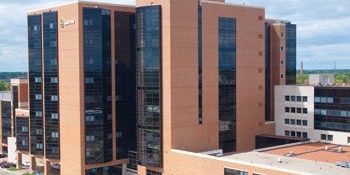It’s our mission to take care of whomever walks through our doors. Whether critically ill, poor or in decent health, it doesn’t matter: at Sparrow Hospital in Lansing as well as our hospitals in surrounding areas, we help all of our patients get the care and medicine they need to get better and remain healthy.
We treat everyone, including our community’s most vulnerable patients. These are the men, women and children who would otherwise not be able to afford healthcare when they need it most.
Providing excellent care to the poor is a tall order, but a little-known federal program lends a helping hand. Established in 1992, the “340B” program requires pharmaceutical companies to give discounts on drugs to nonprofit and public health systems that treat high numbers of low-income patients.
Because the program is funded entirely by the discounts hospitals like Sparrow receive from drug companies, it doesn’t cost taxpayers a cent. In fact, the program helps taxpayers save money by helping hospitals keep their patients healthy and out of the emergency room.
Unfortunately, some in the pharmaceutical industry are pressuring Congress and government agencies to change the 340B program and to scale it back. Keep in mind that the program represents about 2 percent of U.S. drug revenues, which amounted to $457 billion in 2015, according to the Department of Health and Human Services.
Many of the patients seen at our locations are covered by Medicare, Medicaid, or are uninsured. To provide them with the medical attention they need, we deliver a great deal of uncompensated care, which 340B helps us sustain and subsidize.
In the 10 years we have been involved in this program, we have been able to use the savings from 340B to support clinics and treatments at rural hospitals, including Sparrow Clinton and Sparrow Ionia hospitals. This allows people to receive care closer to home. Clinics and hospitals have an especially difficult time affording expensive drugs, but the 340B program allows them to attain those drugs at a discounted price and offer it to any and all patients who need them. We can’t simply explain it away when patients are readmitted to the hospital due to the unavailability or high cost of a drug; we must continue to be able to provide the prescriptions that will keep people healthy.
Without 340B savings, our ability to do so would be decreased or in some cases, eliminated. Through a partnership with Meijer pharmacies, we have the opportunity to gain even greater access to the benefits of the 340B program.
We have also been able to expand our services outside of the walls of our hospitals by building and maintaining community health clinics, including the Cristo Rey Community Center Health Clinic here in Lansing. Clinics like Cristo Rey play a key role in providing for our homeless population, allowing them to stay healthy and prevent costly emergency services. With 340B savings, we are able to subsidize a large portion of the cost it takes to run these clinics. We also have used these savings to support the installation of a clinic with full-time staff within a nearby Volunteers of America shelter, integrating housing and health care for the homeless.
We appreciate that our representatives in Congress understand our need to provide a strong safety net for people in our region. We are happy to do it. Without the 340B program, though, those with the greatest need in Lansing and surrounding areas could lose access to critical services, and our efforts to serve all of our patients with the best care possible would be compromised.
You can read the full article by Darwin Brewster, executive director of community care at Sparrow Health System, in the Lansing State Journal.







